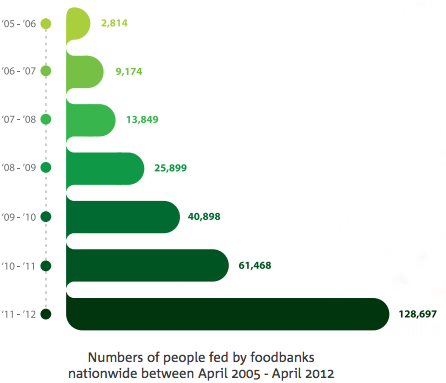How does the Coalition score on food poverty and living standards?
"Just think of all the proud achievements they've notched up in just 32 months: a six-fold increase in people relying on food banks [...] and the longest fall in living standards for nearly a century." Owen Jones, The Independent, January 7 2013
NB: This article was updated on January 15, 2013.
Halfway through the government's term in office, a number of papers published their report card of the Coalition's achievements so far. Some delivered positive verdicts; others, like Owen Jones in the Independent, were less enthusiastic.
We picked two claims from Jones' article which we felt stood out, in that they were striking and fairly specific. According to Jones, there's been "a six-fold increase in people relying on food banks" and "the longest fall in living standards for nearly a century." Are things really so dire? Let's find out.
The Trussel Trust started out in 1997 as a humanitarian initiative in Bulgaria, and launched its first UK food bank in Salisbury in 2004. Last month they published a report with a round-up of their work so far.
They're the main source for Owen Jones' claim on food banks, which was originally raised by Ed Miliband at PMQs on December 19:
"Is the Prime Minister as concerned as I am that there has been a sixfold increase in the last three years in the number of people relying on food banks?"
Are the numbers really so staggering?
According to the Trussel Trust, their foodbanks fed 128,697 people nationwide in the 2011-12 financial year, "100 per cent more than the previous year. Numbers fed by our foodbanks have risen by 397 per cent since 2008."
They added,
"New foodbanks are opening at the rate of three a week and the number of people fed by foodbanks has doubled to almost 130,000 in the last year alone"
Leaving aside the fact that a rise by 397 per cent signifies a five-fold increase, not a six-fold one, it's important to note that since this increase can be traced to 2008, it is at least in part attributable to the Labour government rather than just the Coalition, as one might infer from Jones' article.
There is also a point to be made that this increase in the number of food banks doesn't necessarily mean demand for food banks has grown at the same rate. It could be that the demand was always there, and we can explain the growth in food banks as a drive to respond to it. Since 2004 The Trussell Trust has launched over 250 foodbanks nationwide.
Here is how the Trussel Trust illustrated their growth since the launch of their foodbank network:

In 2005/6, the Trussel Trust foodbanks fed 2,814 people. Does this mean there were only 2,814 people in need of food banks in the whole of the UK? Unlikely.
However, this is not to say the demand for food banks has not grown. In its first year, Salisbury foodbank fed 600 people. We asked the Trussel Trust how many people relied on the Salisbury bank last year. It was 4000, a 566% (more than six-fold) increase in the six years. Of course this could also mean that awareness of the foodbank has grown since then. Once again, at least 5 years of the growth were overseen by a Labour administration. This point is lost in Owen Jones's article.
On to the second claim.
We contacted Owen Jones to ask for his source for the following claim: [we have witnessed] "the longest fall in living standards for nearly a century." The Independent's columnist pointed us to research published by the Resolution Foundation which in 2011 carried out an analysis on wages based on data from the Office for Budget Responsibility and the Office for National Statistics.
"After controlling for inflation (in constant 2010 prices), median wages of full-time employees were £25,570 in 2003 and will be £25,559 in 2015."
Two years ago - eight months into the coalition's rule - the then Bank of Engand governor Mervyn King commented on the findings saying this is "the most prolonged fall in living standards for more than 80 years."
It's worth pointing out that the Resolution Foundation's findings were based on 2010 wages and inflation figures, so it's not fair to attribute the projected outcome to two and a half years of coalition government, as opposed to the combined effect of Labour and coalition policies as well as the global financial situation.
In fact, the Resolution Foundation itself found that "official figures show that wages had already stopped growing as far back as 2003," seven whole years before the coalition took power.
Though we can't account for Owen Jones' overall assessment of the coalition's track record, there is data for the two claims we selected at the beginning of this article. Unfortunately, most of it relates to the period before the coalition government was elected. In fact, both phenomena - the growth of food bank numbers and the plunge in living standards - took hold during the Labour administration.
If you have seen any other coalition report cards claims that you'd like us to check, please get in touch.
Update: The University of Bristol and the CEPS/INSTEAD Research Institute presented a research paper on food poverty to the EU Task Force on Material Deprivation. Using data published by the Eurostat on Income and Living Conditions, the task force was able to outline the "inability to afford a meal with meat, chicken, fish (or vegetarian equivalent) every second day" in various European countries since 2005.
The dataset relating to the United Kingdom shows the number of families that are unable to afford certain types of food:
Though this data isn't by any means comprehensive, it does raise some questions about the notion that food poverty grew after the Coalition entered office.
---
Flickr image courtesy of vancouverbcfoodbank